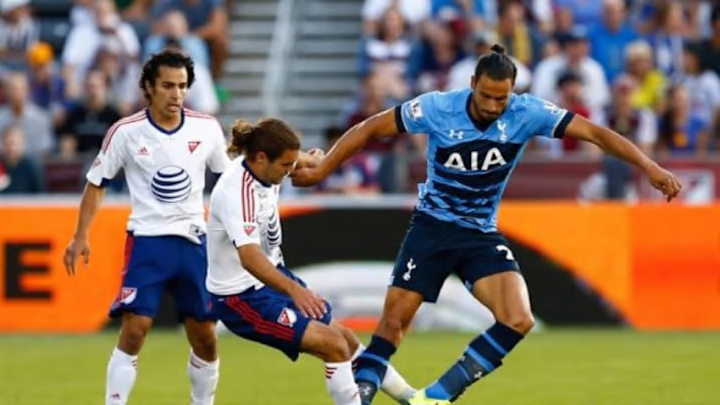There was good reason for Spurs to be confident ahead of their trip to Crystal Palace on Saturday.
Tottenham came into the game with the best defense in the league, while Palace’s offense has easily been the worst in the country over the last month. Alan Pardew’s men had failed to score in each of their last five Premier League matches, three of which had ended in defeat.
Nothing about the opening exchanges hinted that this match would do anything to change either team’s reputation. Spurs were dominant even if they were lacking on the final ball, and Palace could barely manage to get out of their half, much less take a shot on goal.
And yet Spurs found themselves behind in the 29th minute as Palace earned the first goal in their favor in over eight hours of football. A well-worked bit of build up play ended with an attempted cross to Palace forward Connor Wickham that Jan Vertonghen intercepted and misdirected into the back of Hugo Lloris’ goal. It was a bit of poor luck, but it was far from Spurs’ biggest problem in the first half.
Spurs’ dominance in the beginning of this match resembled their first half performance against Everton that began the year: it had all the ingredients of multiple goals but none of the end product. While Everton owed a lot to luck – and their right goal post – Palace could make an actual claim to getting the best of Spurs, at least for a time.
More from Hotspur HQ
- Storybook ending after difficult period for Tottenahm’s Richarlison
- Tottenham comeback showcased invaluable intangible Ange has cultivated
- Tottenham player ratings in 2-1 comeback win over Sheffield United
- Tottenham projected starting 11 for Sheffield United
- Tottenham’s Richarlison says he’s going to seek psychological help
Rather than holding rigid lines in front of goal, Palace’s defenders actively closed down any Spurs player that got so much as a sight on goal or another player. Dele Alli might have ended the match as Spurs’ hero, but his first half was mired in a densely packed area in front of Palace’s penalty box blunted, and Heung-min Son was kept quiet despite just coming off a wonderful game against Leicester midweek.
The narrowness Spurs favor worked against them here as Palace’s players could close down threats without having to worry about being pulled apart all that much. Palace spent much of the opening sixty minutes watching Spurs pass the ball laterally back and forth from just on the edge of their defensive third, unable to find a clear way through to goal or even the penalty area.
It took Mauricio Pochettino catching onto this fact for the game to suddenly find its pivot point.

The Spurs coach took Eric Dier off in the 55th minute in favor of adding Nacer Chadli. Alli dropped deep along side Mousa Dembélé, Christian Eriksen moved to the center and Chadli set up shop on the left wing.
That move was vitally important for one very good reason: Chadli knows how to play wide, and he knows how to play direct. It’s no coincidence that the equalizer came only eight minutes after his arrival on the pitch. Harry Kane leaped for a chipped cross from Chadli just on the outside of Palace’s penalty area and sent it past Wayne Hennessey.
That wasn’t the end of it, though. Palace found more and more chances to get forward as Spurs’ game shifted into less control and more attack. Indeed, Wilifried Zaha came close in the 70th minute and Palace had a shot ricochet off the frame of the goal after Alli’s sensational effort to take the lead in the 83rd minute.
Pochettino’s gamble counted mostly on his confidence that Spurs could find more attacking verve with Chadli on the pitch than Palace could find with more space and chances afforded to them from the midfield on up. It paid off in the end – thanks in part to a fine goal from Chadli himself in stoppage time – but it very well could have ended poorly for Spurs.
Next: Spurs' Four Options After Vertonghen's Injury, Ranked
This is a problem that had haunted Spurs since they inched their way back into relevancy at the turn of the decade. Some teams believe they can sit deep and frustrate Tottenham’s attempts to get through, and they’ve too often been proved right in that assumption.
While Pochettino has done much to relieve some of this weakness, it’s not something that will be resolved overnight. He still needs to find some balance between control and attack, and it’s not yet a given that Chadli is the solution. There’s still some considerable tinkering to be done at Spurs.
